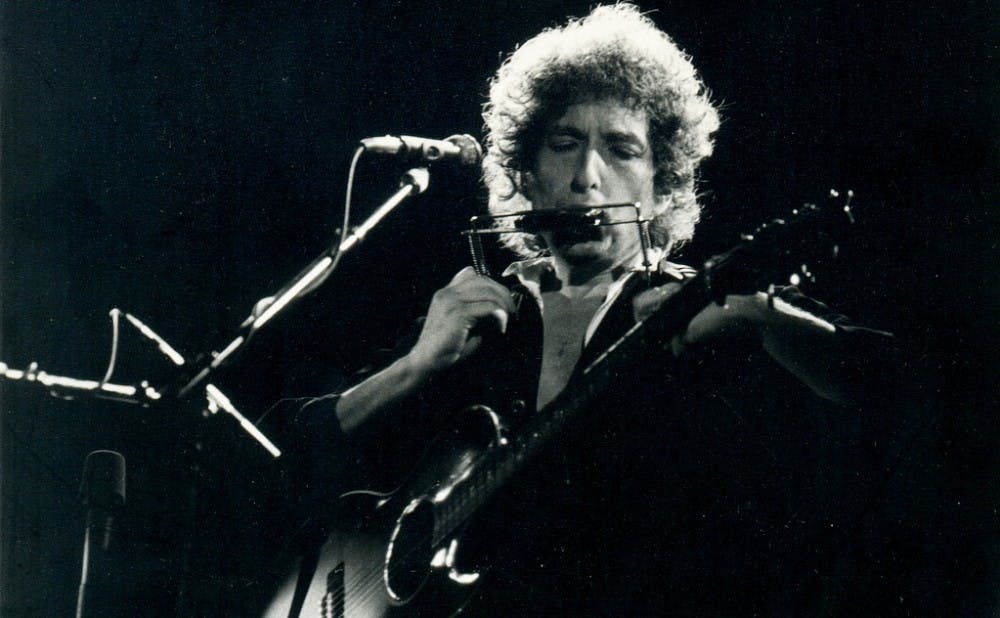When Bob Dylan takes the stage for his performance at the Durham Performing Arts Center Friday, it will be in the midst of a protracted Nobel Prize victory that has at times played out like a soap opera.
The sold-out concert, which is Dylan’s second trip to Durham in two years, comes at a time in which the folk rocker, ever the provocateur, has found a way to smash even the highest echelon of convention. When the Swedish Academy awarded Dylan the Nobel Prize in Literature Oct. 13, it unleashed a whirlwind of controversy. Some greeted the news as a triumph, while others lamented the decision as a stain on the dignity of the prize.
Dylan, who has won numerous awards, including eleven Grammys and the Presidential Medal of Freedom, released a statement last Friday saying this latest honor left him “speechless”—so speechless, apparently, that he did not comment on the award for over two weeks after he won it. That protracted silence, along with the fundamental question of whether Dylan deserved the award, caused much ado among intellectuals, casual onlookers and the Nobel committee itself.
Some observers argue that Dylan’s body of work merits this kind of recognition. Alex Cunningham, a professor of arts of the moving image, considered Dylan a great personal influence and said he appreciated the Nobel Prize’s acknowledgement of music as a legitimate form of literature.
“If the Nobel foundation was going to give an award to one musician, I think they picked the right one,” Cunningham said, noting Dylan’s incorporation of classic poetry and folk traditions into his music and lyrics. “That’s a great tradition in artists—being an educated artist in your form, be it poetry or music, and building upon and evolving upon those traditions.”
Many writers, though, have taken offense to Dylan’s win, pointing to past literary giants that never received the honor. The last American to win the Prize in Literature was Toni Morrison in 1993. To some the Nobel Foundation appeared to overlook an entire generation of distinguished authors in favor of a celebrity songwriter.
Local poet and publisher Richard Krawiec condemned Dylan’s award in a Facebook post, calling it “a slap in the face to dozens of writers from dozens of countries who were far more deserving an award for the literary arts.” In the post, hecited Virginia Woolf, Chinua Achebe and Leo Tolstoy as authors never given the honor of a Nobel Prize.
Dylan’s silence only exacerbated the controversy, provoking one member of the Swedish Academy, Per Wastberg, to call his behavior “impolite and arrogant.”
Yet Dylan fans know that such rebellion is only to be expected of an artist who has made a habit of avoiding overexposure in media (this includes possibly faking a motorcycle accident just to retreat from the public eye.) This reticence extends to his live performances. During his last show at DPAC, even the press was forbidden to take pictures. It follows, then, that he would avoid the spotlight once again thrust upon him by the Nobel Prize.
“His personality is part of his allure,” Cunningham said. “If he had come out right away and accepted the award and made a big speech, that that would have been uncharacteristic. This is just expected, at this point, for him to ignore one of the highest prizes in literature.”
With the circumstances surrounding it, Friday’s concert certainly holds intrigue for those lucky enough to secure a ticket. But knowing Bob Dylan, who once labeled himself a mere “song and dance man,” the show will only be a continuation of the art he has always brought to the world. It’s very possible, perhaps very likely, that he won’t address the Nobel Prize at all. Some may see this as ungrateful, as impolite and arrogant. Some may argue he didn’t deserve the award in the first place. Whether or not his work warranted the highest honor in literature, though, all can agree: this is just Dylan being Dylan.
Get The Chronicle straight to your inbox
Signup for our weekly newsletter. Cancel at any time.

